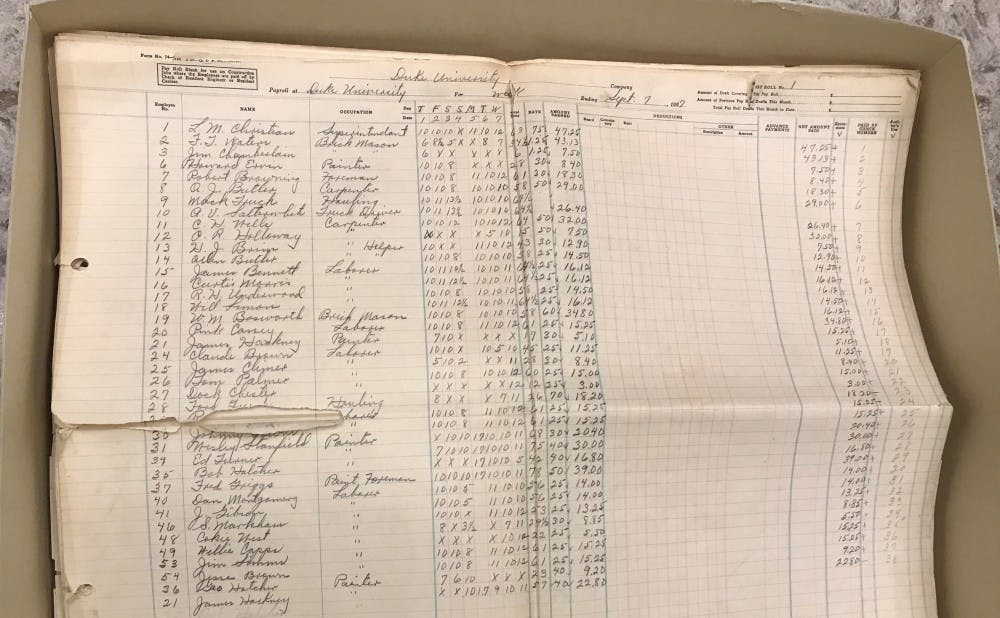Research can be a form of storytelling, of capturing life from decades or even centuries before. It can give the world a better idea of how people used to live.
Housing over 10,000 manuscripts, 350,000 books and artifacts from a variety of subject areas and time periods, the David M. Rubenstein Rare Book and Manuscript Library can be the perfect place for these aspiring researchers and devoted academics in the Duke community and abroad.
Two members of the Rubenstein community, Andy Armacost, head of collection development and curator of collections, and university archivist Valerie Gillispie work alongside other Rubenstein librarians to provide ideas and examples of resources for students and faculty interested in archival research.
The Rubenstein features a number of specific collections, including a human rights collection and records of modern advertising. Graduate and undergraduate students regularly make use of their collections, and researchers from around the world travel to Duke to access rare manuscripts. Here are some of the highlights of the Rubenstein's collection:
Scrapbook of Odessa Massey, 1920s
One of Gillespie's favorites from the Rubenstein collection is a 1920s scrapbook from Duke student Odessa Massey.
"What I love about her is that she was a little bit of bad girl,” Gillispie said. “She went out on a lot of dates and she would break the rules of women's college. She would go in a car without permission or do too many dates in one week, that sort of thing."
In her scrapbook, Massey pasted in all her demerits and write-ups for breaking the rules, as well as dozens of cards from gentleman callers.
"[I love] to see what it was like to be a Duke student through this one particular student 90 years ago," Gillespie said.
A Dialogue Concerning the Two Chief Systems, 1641
This recent addition to the Rubenstein collection discusses the geocentric and heliocentric theories of the universe during the 1600s.
“It was after Copernicus said that everything revolves around the sun, but the official Vatican policy was that everything revolved around the Earth," Armacost said. "So it was difficult for Galileo to write a book about it because he was worried he might get into trouble. He framed the book as two people in a conversation who were just talking about the two theories which gave him the freedom to write about both ideas using historical figures like Copernicus and the ancient astronomer Ptolemy.”
This edition, written in Latin, would have been read and widely distributed in European academia in the late 17th century.
Duke Workers’ Weekly Payroll, 1927
Last summer, the Rubenstein Library hosted a number of Story+ research projects, one of which focused on the workers who built the Chapel.
“This came out of the President being interested in a follow-up to the removal of the Lee statue and wanting to understand more about Duke’s history,” Gillispie said.
The student researchers quickly realized that though the Rubenstein contained detailed records for the building of West Campus between 1927 and 1930, the archive did not have records on the Chapel itself. They decided to expand their research to looking at West Campus as a whole.
“We studied this weekly payroll that lists the name of the person, the job they had, how many hours they worked each day, what they were paid and the total amount they were paid for that week,” Gillispie said. “What the students were able to do was research each individual, study more about their race, compare pay for white and black workers, study buying power in Durham and interview descendants.”
Although their research did not have the initial intended results, it led to discoveries about the role of race in labor relations and clues on how to continue their investigation into Duke history.
“And like any good research project, it inspires more questions," Gillespie said.
Get The Chronicle straight to your inbox
Sign up for our weekly newsletter. Cancel at any time.

